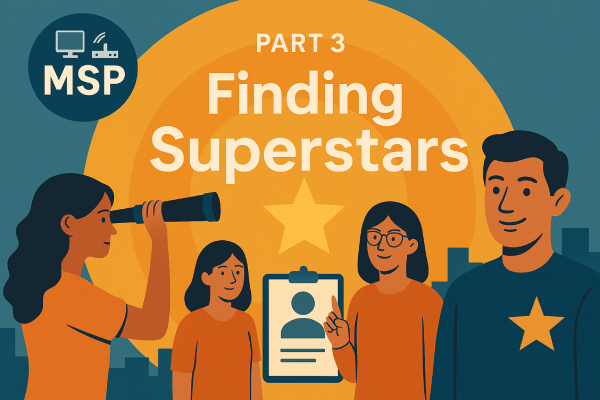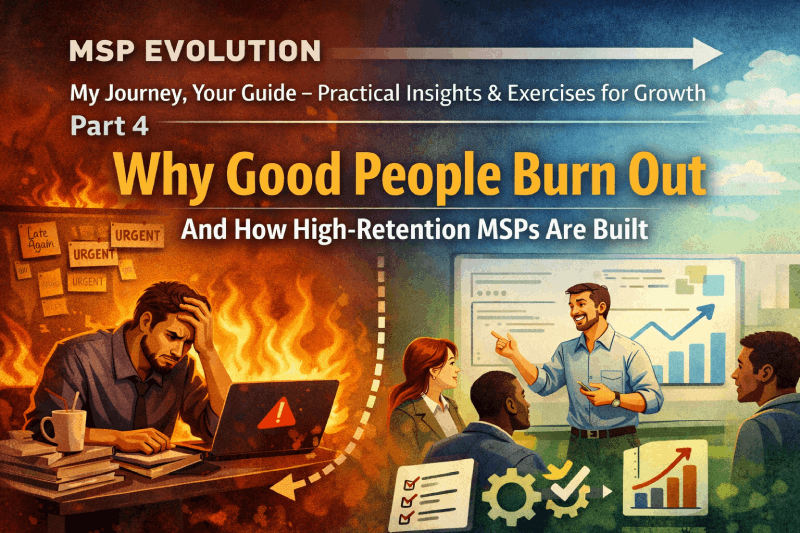Attracting the right candidates to your role
This starts with you first, the MSP owner or the person responsible for hiring. You likely have a good idea of the kind of person that you would like to hire already. For this section, I’m going to ask you to temporarily put those ideas to one side. The type of person you are looking for is likely going to be different for different businesses, but the qualities you are looking for in new staff directly correlate with attracting the right candidate in the first place.
Let’s talk about some of the most common things that I see in the industry here that I think could be a mistake.
Does your job advert ask for someone like this?
“Must have 5 years of experience in Windows Server 2008, Windows Server 2008 R2, Windows Server 2012, Windows Server 2012 R2, Windows Server 2016, Windows Server 2019, Windows Server 2022”
Ask yourself this, would you prefer someone with experience in these specific operating systems or would you prefer someone who has research ability and critical thinking skills to figure out any operating system?
Do you ask for people to blindly follow processes? Is that what you actually want, or would you prefer someone who challenges processes in a positive way in order to improve them?
Do you ask for someone who has good tolerance to a stressful working environment? Is that what you actually want, or would you prefer someone who prioritizes providing quality over ticket volume?
Do you ask for strict certifications? Is that what you actually want, or would you prefer someone who learns anything for the fun of it and can actually retain and apply the skills they learn? (the absolute best questions we used in interviews was “Tell me about your home setup and technology projects you’ve completed at home” and “What technology have you learned about recently”)
Do you ask for someone who can answer the phone and log calls? Is that what you actually want, or would you prefer someone who can spend time building up true relationships with your clients?
It may be if you’re not an MSP owner that you may think you’ll struggle to get the owner onboard with this kind of shift. I was lucky, my old CEO was exceptionally people centric and people development driven so the leadership team was already well aligned in the business for this mentality.
In my previous MSP, we clearly outlined what we were asking for in our job adverts, and exactly why we wanted it:
- Self-developers: who embark both on self-improvement on a personal level and a technical level
- Detail-orientated: because we prioritized rewarding people who provide quality over volume
- Socially caring: because the priority is people and forming relationships with colleagues and clients
- Strong communicator: so they could communicate situations and technical details in a way clients can relate to and understand
- Empathy: so they could place themselves in the shoes of someone else
- Logically deductive and a critical thinker: people with this skill can break down any problem thrown at them and they can generally think outside of the box
- Proactive Automators: people who think about the future, not just the now. The mindset of, how do I solve this problem now and for everyone else in the future
All of the things you ask for in a job advert help candidates get an initial picture of what working for you is going to be like.
Practical Exercise:
Open up the most recent, commonly used job description that you use and ask yourself the following questions:
- Do the things you are asking for from a potential candidate include how that also benefits them back?
Here’s the difference between the two:
- Effective Communicator/Communication Skills
- Effective Communicator: hone your skills as you learn to convey complex information in an understandable and relatable way
One is very much about what the company wants, while the other considers company needs while offering something in return to the candidate.
- Does the role include the exact salary for the role?
Almost every good technical person I know will immediately throw in the bin any job advert that has terms in it like ‘Competitive compensation package”, “Attractive remuneration”, “Generous salary”, “Market-leading pay scale” etc.
- Does the job advert state what you want, or does it work to attract exceptional people?
Read the first two paragraphs of text in your job role. Do they talk about what you and the company want, or do they talk about items that attract a candidate? Here are the first couple of sentences for my old company’s job description: Are you tired of working for companies that prioritise ticket volume and total logged hours over quality and doing the job right? Do you want to take your career in the direction of the cloud/Microsoft 365? Do you truly care about delivering a good quality of service and product to clients?
Think about your job adverts differently. You are not writing a list of requirements for what you need like a shopping list, you are publishing almost a marketing piece to attract exceptional candidates. You do that by talking about what you can offer them, not what they need to deliver to you.
Attracting the right candidates (Part 2)
Have a guess what most exceptional candidates are going to do before they even consider applying for a job? They are going to go to your company website to assess if you’re the type of business they want to work for. This is different for different companies and people, but here is how I personally would assess any potential company.
- Is the site full of stock images, or does it show real people in a real working environment? Does it have character, or does it look boring? Does it explain technical concepts well and easily?
- If I hit the http only version of your website, does it redirect me to the secure version? If it doesn’t, that’s throwing a red flag
- Is there a section on the website that relates to a career at the company? We had a section that was called “Working at our company” that was full of fun images that showed the personality of the people who worked for the company. It also highlighted every benefit of working at the company with graphics for each of those benefits. It even included a slightly redacted version of our internal career development framework
- Does it source recent customer testimonials or feedback, and is that feedback good? Does it include any recent statistics? Our website had the previous month’s customer service statistics on (Tickets resolved/Average call wait time and customer satisfaction).
- Does the site convey the company’s culture and values? This helps potential candidates assess if the company ethos aligns with their requirements and work style.
- Does the site indicate social responsibility and sustainability? I’d specifically look for the company doing things for charities, non-profits, or their local community.
- Are there any employee testimonials? That allows an insight into what the day to day is like
- Are there any awards or recognition? I’m looking for things like Cyber Essentials certifications, ISO certifications, positioning in the MSP 501, participation in ‘best place to work’ type schemes and awards.
- Is there a mention of work/life balance? Remote working? Flexible hours? Wellness programs?
The key component to take away here is your website is not just a vehicle to attract clients but to also attract staff too. A bad site for your company may well not just put off those exceptional candidates but it may put off potential clients too.
Attracting the right candidates (Part 3)
The benefits you provide to your staff end up saying a lot about the type of business that you are. At my old MSP, the benefits were outlined on the public website (remember, it’s a vehicle to attract staff as well as clients) and there were quite a few of them. Benefits are going to be heavily dependent on where you live, but I want to highlight some of the ones I consider the most important:
Profit share for all staff
Staff, especially exceptional people, are going to perform better when they see a direct incentive to perform, and a profit share is a good place to start. Not only will this boost employee satisfaction and retention but it will help rally them to achieve shared goals. I expect some people would say “But I’m already paying them x salary, why should I pay out in a profit share?” This again falls back to whether you want to attract and retain just standard people, or exceptional people.
Decent Vacation/Holiday allowance
The starting days at my old MSP were 23 days + bank holidays – for every employee as a minimum (my old MSP was UK based for the US people who are undoubtedly shocked by how much vacation you get in the UK). This was a total of 30 days a year. This increased with additional days per year served. To me, this is so important, especially for the people in the company who need to do forward thinking, innovative, out of the box thinking. Everyone is different, but I found some of my best thinking and ideas were not done when I was purposely trying to solve a problem, but when I was doing something unrelated to work and my brain was switched off. I think everyone, to a degree, needs time away from work to recharge their batteries. It is up to the leaders of the company to identify people who would benefit from a break.
Company Awards and Bonuses
This is a great way to identify and reward exceptional things done by your staff in a particular time period. Recognition of effort is such an effective thing to do in any business. My old MSP had award nights, with real trophies and real prizes, where we’d all get together and celebrate people’s success.
Overall, my old MSP had over 20+ benefits for staff working there – all done to help attract exceptional people.
Last Thought
It’s a hard pill to swallow, and it may not be the case worldwide but for the most part, the exceptional candidates I’ve talked about are already in jobs and you are going to have to work hard to attract them to your business, but they are worth their weight in gold. I expect most people reading this when thinking about their own companies, if I asked you to name one of the superstars working in your company then you’d likely have a name immediately come to mind. This was actually how we wrote our people centric job description; we identified these people and questioned why our minds had identified them as superstars. From there you can start to outline the skills that are actually valuable to you, not just the ones you think should be valuable to you.
Practical Exercise:
Identify one of the employees working in your MSP who you would define as a superstar and write down five qualities you think this person has.
- Are these reflected in the job descriptions you have?
- Are you doing enough to retain this superstar employee?
- Are there skills this person possesses that they can teach to others?





Start the conversation